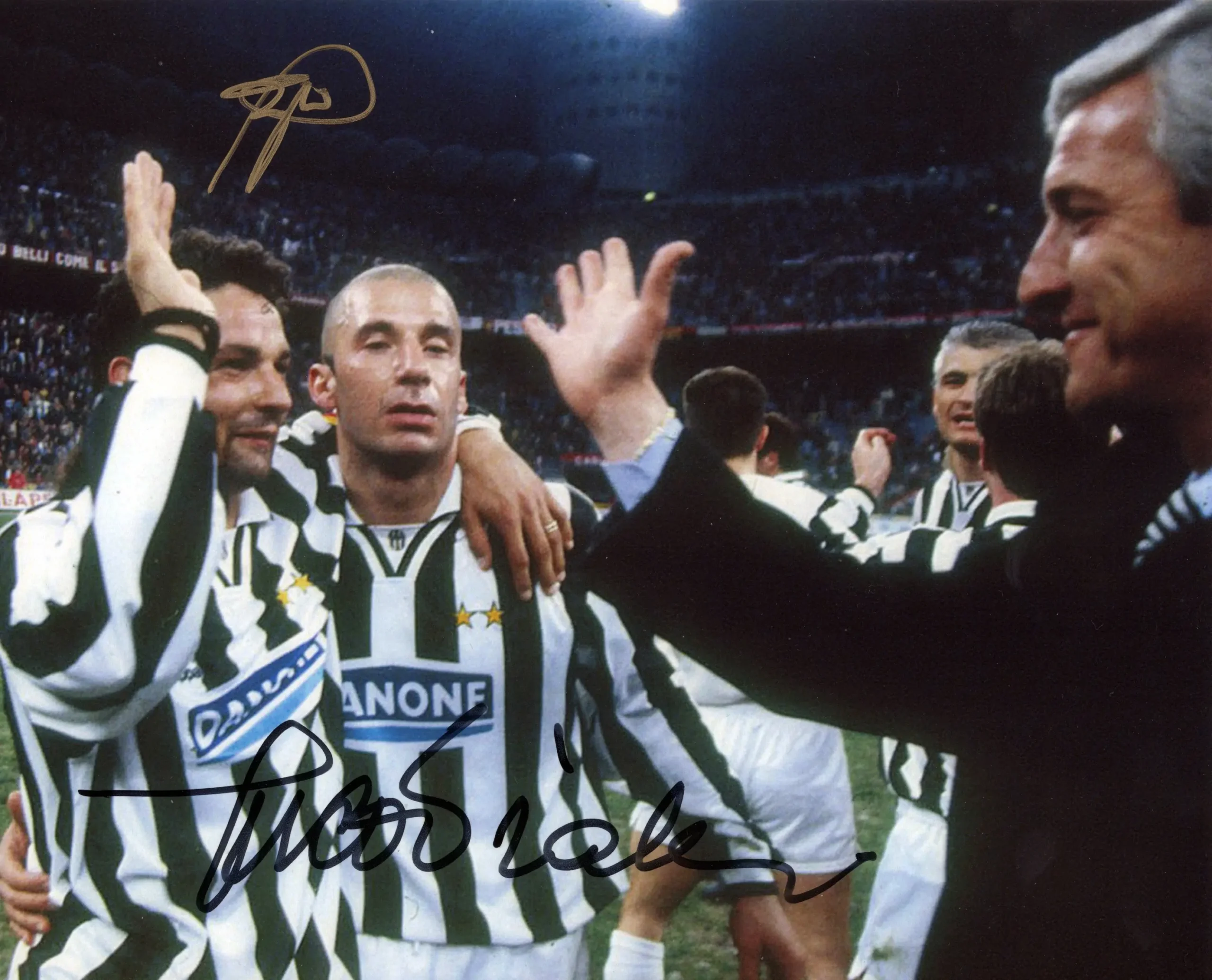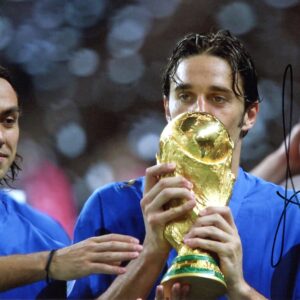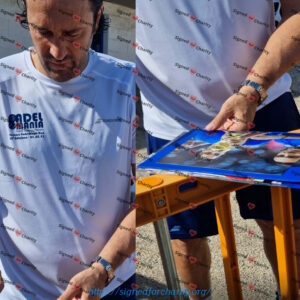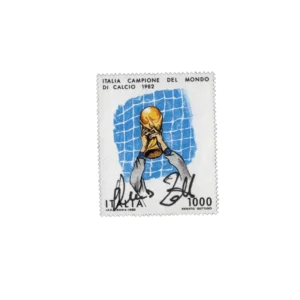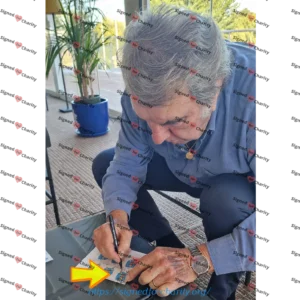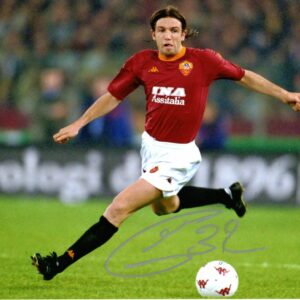Description
GIANLUCA VIALLI BIOGRAPHY :
Gianluca Vialli (Cremona, 9 luglio 1964) è un dirigente sportivo, allenatore di calcio ed ex calciatore italiano, di ruolo attaccante, capo delegazione della nazionale italiana. Tra i migliori centravanti degli anni 1980 e 1990, rientra nella ristretta cerchia dei calciatori che hanno vinto tutte e tre le principali competizioni UEFA per club, unico fra gli attaccanti. Vincitore di numerosi trofei in campo nazionale e internazionale, è stato capocannoniere dell’Europeo Under-21 1986, della Coppa Italia 1988-1989 — in cui ha stabilito, con 13 reti, il record assoluto di realizzazioni in una singola edizione del torneo —, della Coppa delle Coppe 1989-1990 e della Serie A 1990-1991. Tra il 1985 e il 1992 ha totalizzato 59 presenze e 16 reti nella nazionale italiana, prendendo parte a due Mondiali (Messico 1986 e Italia 1990) e un Europeo (Germania Ovest 1988); al suo attivo anche 21 gare e 11 gol con l’Under-21, con cui ha disputato due Europei di categoria (1984 e 1986). Più volte candidato al Pallone d’oro, si è classificato 7º nelle edizioni 1988 e 1991. Nel 2015 è stato inserito nella Hall of Fame del calcio italiano.
Gianluca Vialli (Cremona, 9 luglio 1964) è un dirigente sportivo, allenatore di calcio ed ex calciatore italiano, di ruolo attaccante, capo delegazione della nazionale italiana. Tra i migliori centravanti degli anni 1980 e 1990, rientra nella ristretta cerchia dei calciatori che hanno vinto tutte e tre le principali competizioni UEFA per club, unico fra gli attaccanti. Vincitore di numerosi trofei in campo nazionale e internazionale, è stato capocannoniere dell’Europeo Under-21 1986, della Coppa Italia 1988-1989 — in cui ha stabilito, con 13 reti, il record assoluto di realizzazioni in una singola edizione del torneo —, della Coppa delle Coppe 1989-1990 e della Serie A 1990-1991. Tra il 1985 e il 1992 ha totalizzato 59 presenze e 16 reti nella nazionale italiana, prendendo parte a due Mondiali (Messico 1986 e Italia 1990) e un Europeo (Germania Ovest 1988); al suo attivo anche 21 gare e 11 gol con l’Under-21, con cui ha disputato due Europei di categoria (1984 e 1986). Più volte candidato al Pallone d’oro, si è classificato 7º nelle edizioni 1988 e 1991. Nel 2015 è stato inserito nella Hall of Fame del calcio italiano.
ROBERTO BAGGIO BIOGRAPHY :
Roberto Baggio (born 18 February 1967) is an Italian former professional footballer who mainly played as a second striker, or as an attacking midfielder, although he was capable of playing in several offensive positions. He is the former president of the technical sector of the Italian Football Federation. A technically gifted creative playmaker and set piece specialist, renowned for his curling free-kicks, dribbling skills, and goalscoring, Baggio is widely regarded as one of the greatest players of all time. In 1999, he came fourth in the FIFA Player of the Century internet poll, and was chosen on the FIFA World Cup Dream Team in 2002. In 1993, he was named FIFA World Player of the Year and won the Ballon d’Or. In 2004, he was named by Pelé in the FIFA 100, a list of the world’s greatest living players. Baggio played for Italy in 56 matches, scoring 27 goals, and is the joint fourth-highest goalscorer for his national team, alongside Alessandro Del Piero. He starred in the Italian team that finished third in the 1990 FIFA World Cup, scoring twice. At the 1994 World Cup, he led Italy to the final, scoring five goals, received the World Cup Silver Ball and was named in the World Cup All-Star Team. Although he was the star performer for Italy at the tournament, he missed the decisive penalty in the shootout of the final against Brazil. At the 1998 World Cup, he scored twice before Italy were eliminated by eventual champions France in the quarter-finals. Baggio is the only Italian to score in three World Cups, and with nine goals holds the record for most goals scored in World Cup tournaments for Italy, along with Paolo Rossi and Christian Vieri. In 2002, Baggio became the first Italian player in over 50 years to score more than 300 career goals; he is the fifth-highest scoring Italian in all competitions with 318 goals. In 2004, during the final season of his career, Baggio became the first player in over 30 years to score 200 goals in Serie A, and is the seventh-highest goalscorer of all time in Serie A, with 205 goals. In 1990, he moved from Fiorentina to Juventus for a world record transfer fee. Baggio won two Serie A titles, a Coppa Italia, and a UEFA Cup, playing for seven different Italian clubs during his career (Vicenza, Fiorentina, Juventus, AC Milan, Bologna, Inter Milan, and Brescia). Baggio is known as Il Divin Codino (“The Divine Ponytail”), for the hairstyle he wore for most of his career, for his talent, and for his Buddhist beliefs. In 2002, Baggio was nominated Goodwill Ambassador of the Food and Agriculture Organization of the United Nations. In 2003, he was the inaugural winner of the Golden Foot award. In recognition of his human rights activism, he received the Man of Peace award from the Nobel Peace Prize Laureates in 2010. In 2011, he was the first footballer to be inducted into the Italian Football Hall of Fame.

